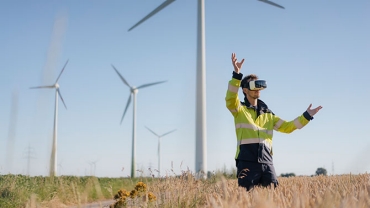
ESG in investment strategy and portfolio management
‘The private equity (PE) industry is making significant progress on implementing ESG aspects in their investment strategy and portfolio management’, says Joukje Janssen, PwC Partner for Sustainability. This is her main conclusion from PwC’s recent Global Private Equity Responsible Investment Survey 2021. At the same time, Janssen identifies many opportunities for private equity to build on the progress made: ‘In addition to the E for environmental and the G for governance, the S for social offers opportunities for improving sustainability.’

Global Private Equity Responsible Investment Survey 2021
'ESG aspects are increasingly being taken into account by private equity houses', says Janssen, 'which is encouraging. The development of responsible investment in the PE industry is also in line with what is happening in the broader market. Sustainability as a subject is really on the rise.'
209 PE houses from 35 countries participated in the Global Private Equity Responsible Investment Survey 2021. 81 percent of which were from Europe. In recent years European firms have had to adapt their strategies and investments in order to comply with EU regulations requiring robust ESG disclosures. Joukje Janssen is a member of the research group that conducted the survey: 'In Europe, there is a lot of attention for ESG, but we also see growth in the United States. ESG focused assets in the US increased by about five trillion dollars in two years’ time.'
Three striking shifts
According to Janssen, the survey findings show that large steps have been made over the past few years. Compared to the 2019 survey, three things certainly stand out:
- On the agenda more often: respondents who indicate that ESG is on the agenda in board meetings more than once a year increased - from 35 to 56 percent.
- Value creation displaces risk management: respondents who cited value creation as one of the main drivers of ESG activity increased. In 2019, risk management was the main driver.
- Beyond concerns more measures: half of the companies in the survey manage climate risks in their portfolios and 36 percent consider climate risk when making investment decisions. In 2019, the vast majority of PE companies said they were concerned about climate risks, but action lagged behind.
From risk management to value creation
The survey shows that 72 percent of respondents always assess companies for ESG risks and opportunities prior to the acquisition phase. According to Janssen, the shift from risk mitigation to value creation opportunities as the main driver for responsible investment shows 'that the ESG mindset of private equity is entering a stage of maturity'.
'This is also reflected in the fact that more than half of the firms surveyed stated that the ultimate responsibility for responsible investment lies with the management of PE firms rather than with a specialised ESG team. The Dutch PE houses that took part in the survey score even better in this respect. They are more successful than the average when it comes to integrating ESG factors into their investment strategy.'
Governance gets a lot of attention
Looking at the measures PE houses take with regard to Environmental, Social & Governance, it is striking that governance issues receive a lot of attention. Janssen: 'By far most PE houses surveyed actively prevent bribery and corruption. Also, 79 percent of the respondents have taken measures related to business ethics, values and culture.'
Janssen is not surprised: 'In a business environment, these subjects of corporate governance are directly linked to day-to-day operations. Less action is taken on governance issues that are more remote from the board room, such as emerging technology, automation and the future of work.'
Environmental is more than CO2
PE translates environmental issues into, among other things, CO2 emissions. Janssen: 'On this topic, we have seen a clear increase in attention over the past five years. In 2016, PE took measures for less than twenty percent of the CO2 footprint in the portfolio, now it is more than forthy percent. This will partly be due to European regulations. And CO2 is easy to measure, which makes it attractive to set goals and take action on this topic. We also see attention for CO2 in the broader society. Biodiversity, which is certainly a pressing issue in the Netherlands, can count on less attention, also from PE firms.'
Social: human rights require attention
When it comes to social issues, the survey shows that more than ninety percent of respondents are concerned about diversity and inclusion. 46 percent of the surveyed companies have diversity targets for gender and/or ethnic minorities. As with CO2 emissions, Janssen sees the benefit of measurability: 'Companies measure the male/female ratio at job levels, the (gender) pay gap and create a programme for inclusiveness.'
That is very positive, says Janssen, but social factors are actually so much more. 'For example, are employees of portfolio companies allowed to organise themselves, is the right to strike respected, is there a complaints and reporting mechanism for undesirable behaviour and breaches of integrity, and are these used, how are whistle-blowers dealt with? Issues concerning human rights and labour law are complex and require more qualitative research, but are no less important - certainly for PE houses that invest outside Western Europe.'
'More extensive knowledge about ESG factors changes which questions are being asked when investments are made. Just as everyone in private equity now understands what credit, debit, turnover and profit means, ESG factors will become an integral part of investment strategies going forward.'
SDGs as a framework
As far as Janssen is concerned, PE firms could be even more ambitious: 'ESG and sustainable investment is the roadmap for PE houses aiming to distinguish themselves. At a minimum, work on the best-known topics, such as climate risk, net zero and diversity, and add a few factors that are especially important in the sector in which the house is active.'
Janssen points to the United Nations Sustainable Development Goals (SDGs). 'With this globally used framework, PE houses can position responsible investing more broadly - base it on more ESG factors - and more integrally in their corporate strategies. Sustainability is such a wide-ranging subject that I always advise translating large ambitions into manageable chunks. Just formulate ten non-financial KPIs, take measures and then move on to the next KPIs if the scores are stable. There is always a next subject to tackle.'
EU regulation as a driving factor
Although there are still many directions in which PE can strengthen responsible investment, Janssen is pleased with the steps that have been taken: 'The speed with which ESG factors are being picked up is a large promise for the future. She also looks at external factors, such as the millennial generation who, more than generations before them, consider sustainability when making purchasing decisions. And regulation, certainly in the EU, will remain a driving factor. The European Commission has already indicated that it will strengthen its regulations to combat climate change first of all. In five years' time, social factors will receive more attention also in terms of regulation.'
Increasing knowledge
Janssen also sees increased knowledge as an important prerequisite for change: by collecting more data, hiring ESG specialists and training all employees of PE companies. 'More knowledge about ESG factors changes what questions are asked when investing. Just as everyone within private equity now understands what makes a good investment, so too must ESG factors be at the heart of the investment strategy.'
Janssen sees an important role for the PE sector in particular: 'PE knows how to create value over the long term with a strategic approach. The increasing attention to responsible investment from this sector is a win-win situation. On the one hand, it is crucial for making the world more sustainable, but on the other hand, it also offers great opportunities for PE itself to create additional value.'
Contact





















